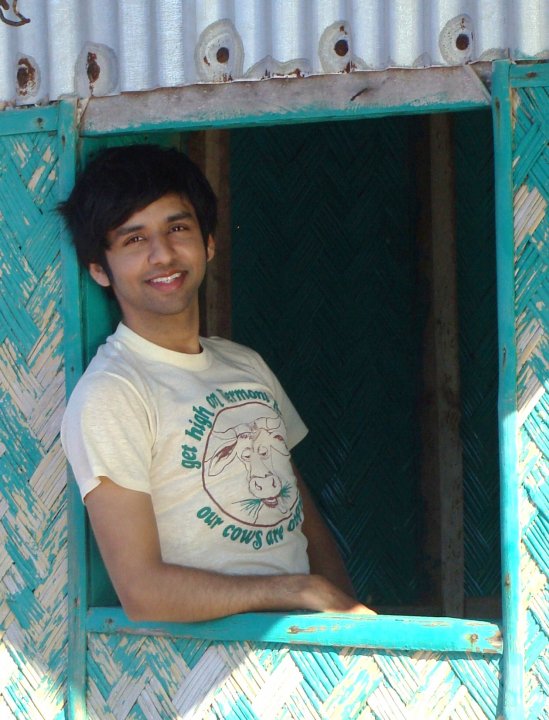Kyodo News “JET Alumni” series: Jenson Deokiesingh (Toyama)
News agency Kyodo News has recently been publishing monthly articles written by JET alumni who were appointed in rural areas of Japan, as part of promotion for the JET Programme. Below is the English version of the column from December 2013. Posted by Celine Castex (Chiba-ken, 2006-11), currently programme coordinator at CLAIR Tokyo.
*********

I am reminded that my love story was very much a mutual one and I fondly think, “In life we meet, only to part, so we can meet again.”
Untitled
I have always loved Yayoi Kusama. There’s an unexplainable magic and unorthodox beauty about her signature polka dot patterns. I had seen compelling images of her kaleidoscopic, “Love is Calling,” installation designed specifically for the Mori Art Museum’s 10th Anniversary Exhibition and immediately knew I had to see it.
On September 1st, my last day in Japan and ironically the last day of the “All You Need Is Love” exhibition, I went searching for Kusama to bid her a final farewell.
As I meandered from one provocative exhibit to another, I found myself riveted to the entrance of the section, “Losing Love”. Written on the stark white wall, in simple black text, were the words: Great love stories are often about the encounter with and subsequent loss of loved ones. I stood there, in a trance, repeating these words, over and over, until they became deeply etched in my memory.
A film of tear glazed my dark brown eyes; wedged in my throat was a painful lump; and my heart slowly crumbled with each excruciating beat it gave. The inevitable truth I was desperately trying to avoid was now blinding me in a sobering reality. My life as a JET, my Japanese love story, was irrefutably over.
On Friday, October 18th, I had my first job interview since returning to my vibrant and colourful country of Trinidad and Tobago. Truthfully, the interview was going terribly. A frightening combination of nerves and adrenaline had left me uncharacteristically inarticulate. I was about to cite it as one for the history books, when the interviewer inquisitively said, “Please tell me about your experience on the JET Programme.”
That one sentence was all I needed to give me the confidence I had momentarily lost. With an inescapable smile imprinted on my face, I gleefully declared that living and working in Japan have been incontrovertibly the best experience of my life thus far. And, it truly was.
My first years in Toyama are as vivid and clear as Toyama’s spring mountain waters. The hot embarrassment pulsating through my body as I wished the staff after a long day’s work “Gochisousama deshita (Thank you for the feast)” instead of the customary “Otsukaresama deshita (Thank you for your hard work)” still turns my brown cheeks rouge. Excitedly waking up early in the morning for my first school photo, wearing my best suit, whistling as I biked to work, and then having a crow defecate on my new suit still brings me uncontrollable laughter. Taking a lunch break at the school’s garden, reading Haruki Murakami’s “Sputnik Sweetheart” and then being stung by a several caterpillars still gives me chills. However, crazily running into the staff room, shouting, “Itai! Abunai! Itai! (Pain! Dangerous! Pain!)”, and having my vice principal heroically take the school’s vacuum to vacuum my back change those shudders into immeasurable smiles.
Since returning home I’ve been asked on several occasions, “What do you miss most about Japan?” I always nostalgically respond- the kindness of its people, the unmatched beauty of its scenery and my students, whose radiant smiles can make the worst Toyama winter seem like an eternal spring.
I was an English teacher, a job that I still hold dearly to my heart. It has been undeniably the best job I have ever had, and quite frankly, I reckon the best job I ever will have. Teaching in Namerikawa, a small fishing town famed for its delicious firefly squids, and working at a special needs school enveloped by never-ending rice fields in Higashi Toyama has forever redefined who I am. I believe I learned far more than I taught.
When I think about the world’s great love stories, they often seem punctuated by immense heartbreak, by an unexpected loss. Five years ago, I left my humble village of Balmain nestled in the sugar cane plantations of Trinidad and Tobago and stepped foot in the quiet prefecture of Toyama. Never in my wildest dreams did I ever expect to fall in love. My love story isn’t a romantic ballad, or a heroic act, or about a boy walking into a stunning sunset with a beautiful girl.
My love story is far simpler. It’s about my students who happily shouted, “Good morning!” everyday as I peddled my way to work; it’s about the men and women who played “fresh” tennis with me at the height of the scorching Japanese summer at the local elementary school gymnasium; it’s about the women at the Uozu City Hall who embraced a stranger and turned him into a son; it’s about the kindness of my co-workers who selflessly assisted me during my cries of help; it’s about the laughter of my students echoing in the corridors breaking the silence of the bitter cold; it’s about a young man and his adopted community.
In my lonely hours, I sometimes feel that my experience in Toyama was very much like unrequited love. I loved her deeply but my unselfish love was never reciprocated. I was just one of many that came and fell in love and soon I, not her, would be a distant memory. But as I check my e-mail, I read, “Jenson-sensei, we miss you.” I am reminded that my love story was very much a mutual one and I fondly think, “In life we meet, only to part, so we can meet again.”
Fin


Comments are closed.